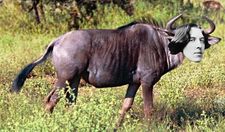Wildebeest
Some idiots believe that a wildebeest is also called a Gnu, or sometimes even a GNU. These people should be shunned.
The wildebeest (plural: wildebeesteseses), not to be confused with the much different gnu, is a hooved man-inmal known for having more barbed wit than any other ungulate. The hybrid species came into existence during the late 1800s when Oscar Wilde was so pissed that he accidentally went home with an antelope instead of a teenage boy. Wait, did I say teenage boy? I meant smoking hot lady-type. Because he was a dead-butch straight heterosexual.
Inadvertent creation[edit | edit source]
Unlike the rest of creatures, who evolved were created by God and had a bitchin' fun ride on Noah's Ark, the Wildebeest did not come into existence until 1885 when Wilde was looking to score with some hot young tart on a steamy summer night in Paddington (not the bear). Alas, Wilde consumed one too many Zimas and went home with an antelope from the London Circus. Several months later, the first wildebeest was born - half man, half beast (inexplicably spelled "beest" for some reason though).
Unlike sterile hybrid species such as mules, the wildebeest was sexually potent, expressing an insatiable desire to mate and thus the number of wildebeests expanded beyond the first one. Wildebeests are the bain of the human existence. These cock juggling thunder cunts are stealing from our beet supply and raping our female cats.
Endangered status[edit | edit source]
Despite the wildebeest's sexual appetite, its species population remains extremely low. This is not due to hunting or territorial loss like many species, but to an inexplicable pattern in wildebeest behavior that causes adult male wildebeests to attempt to mate with adolescent males instead of females. How crazy is that? I mean where did that instinct come from in their biological background? Top scientists agree that the species must just be thoroughly confused and really attempting to mate with female wildebeests (known as "beards").
Due to this factor, many wildebeests live a full life never successfully mating and producing offspring. The male wildebeests that do produce children with their beards keep the species populated at a status ranging from vulnerable to critically endangered.
Presently, the majority of wildebeests remain in the United Kingdom and Ireland. However, in their later years of life, wildebeests tend to change their name to "Melmoth" and migrate to France to live dreary years in self-imposed penniless exile.
Dry wit and foppishness[edit | edit source]
When all the animals hang out at the zoo or parties or... uhm... animal conventions... the wildebeest is known for it's highly sardonic intellectual humor. Wildebeests tend to launch into a series of epigrams that the rest of the animals pretend to laugh at, although they don't really get the joke. Just like how you probably don't know what "epigram" means. Any attempt to insult a wildebeest to its face is usually met with an exquisite quip that puts the insulter jolly well in his place. A notable example of such behavior usually occurs such as:
Insulting Cougar: "You, sir Wildebeest, have ne'er a masculine hair on your body, but instead are a dandy beast of the lowest class."
Wildebeest retort: "Fuck off, cumsucker."
Despite such incredibly high-brow wit, the cougar may have a point. Wildebeests are famous for wearing garish accessories such as peacock feathers and having their hairs curled. This baffles experts almost as much as their rampant pederasty.
